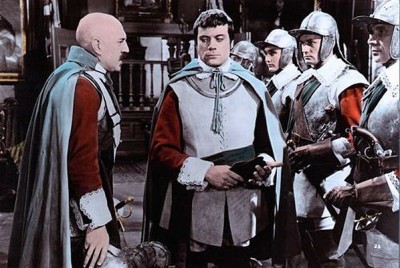| Reviews & Columns |
|
Reviews DVD TV on DVD Blu-ray 4K UHD International DVDs In Theaters Reviews by Studio Video Games Features Collector Series DVDs Easter Egg Database Interviews DVD Talk Radio Feature Articles Columns Anime Talk DVD Savant Horror DVDs The M.O.D. Squad Art House HD Talk Silent DVD
|
DVD Talk Forum |
|
|
| Resources |
|
DVD Price Search Customer Service #'s RCE Info Links |
|
Columns
|
|
|
Crimson Blade (original title: The Scarlet Blade), The
A Sony Choice Collection manufactured-on-demand release, The Crimson Blade is presented in a somewhat grainy but acceptable 16:9 enhanced widescreen transfer under its American title. (The versions are otherwise identical.) No extras.
The story, set in 1648, pits Parliamentarians (or "Roundheads") led by Oliver Cromwell, against the Royalists (or "Cavaliers") loyal to King Charles I. The source of this conflict, primarily monarchy versus parliamentary governance, plays no role in the film. Simply put, the good guys are the Royalists while the bad guys are the Roundheads. However, some knowledge of history adds to the film's enjoyment. Historically, all of the protagonists' aims, including their hope to rescue a captured Charles I (played in the film by Robert Rietty), are essentially doomed. How will director John Gilling's screenplay resolve this quandary?
Royalist Beverly (John Stuart) is captured and executed by pragmatic but ruthless Col. Judd (Lionel Jeffries, somewhat cast against type), whose adult daughter Clare (June Thornburn) is secretly aiding Royalist refugees. Judd's aide, Capt. Sylvester (Oliver Reed) is in love with Clare and suspects her subterfuge but keeps it under his Roundhead.
Meanwhile, Beverly's sons, Edward (Jack Hedley) and Philip (Clifford Elkin), presumed to have died in battle, plot with wily gypsy Pablo (Michael Ripper) and his band to rescue Charles I before he's moved to the far more secure Tower. The film somewhat awkwardly grafts Robin Hood-like elements (and specifically elements similar to the 1950s Richard Greene TV series) with Edward leading attacks on Roundhead troops from his forest hideout and, U.S. title notwithstanding, adopting the colorful moniker "The Scarlet Blade." The inaptly conventional score likewise tries to be rousing when it would do better to be more thoughtful, given the picture's real interests.
In fact, the film is short on action and not all that interested in its title character as much as those played by Lionel Jeffries and Oliver Reed, who anyway are more interesting actors than Jack Hedley and Clifford Elkin. Jeffries's Col. Judd allies himself to the winning (and therefore more profitable) side, but is a confessed former Royalist himself and understandably conflicted upon learning of his daughter's loyalty to the opposition. Reed's Capt. Sylvester, meanwhile, aware of Clare's secret allegiances, essentially tries blackmailing her into loving him, offering to help her only if she'll love him, conversely threatening to turn her in to father (and certain execution) if she doesn't.
Jeffries is very good in these scenes, including the unexpected, unusual, and strangely touching conclusion to the film, while Reed, Hammer's one homegrown, breakthrough star, dominates with his glowering screen presence. Besides Reed and Ripper, other familiar Hammer names appear, including Suzan Farmer as Edward's sister, Duncan Lamont as a by-the-book Roundhead major, and George Woodbridge as the fat town crier.
Apparently The Scarlet Blade was quite successful in the U.K., probably less so in America, though regardless such relatively cheap (probably well under $500,000), old-fashioned historical adventures were growing extinct as much bigger budget spectacles (e.g., El Cid) and films more polished, less juvenile and more adult than The Crimson Blade (e.g., The War Lord, Becket) began to dominate, albeit only briefly.
Video & Audio
The Crimson Blade is presented in its original 2.35:1 MegaScope format, but it's not entirely clear whether MegaScope, in this instance, meant that the film was shot with anamorphic lenses (a la CinemaScope and Panavision) or filmed "flat" and converted to ‘scope for release prints (a la SuperScope). This might explain the graininess of the image, but regardless the transfer looks reasonably good with decent color and contrast. There are no menu screens: the film simply starts after the usual FBI warnings, and automatically restarts again after it's finished. The mono audio, English only with no subtitle options, is okay, and the disc is region-free. No Extra Features.
Parting Thoughts
Not great but for Hammer fans (including this writer) a reasonably enjoyable film of its kind. Mildly Recommended.
Stuart Galbraith IV is the Kyoto-based film historian and publisher-editor of World Cinema Paradise. His credits include film history books, DVD and Blu-ray audio commentaries and special features.
|
| Popular Reviews |
| Sponsored Links |
|
|
| Sponsored Links |
|
|
| Release List | Reviews | Shop | Newsletter | Forum | DVD Giveaways | Blu-Ray | Advertise |
|
Copyright 2024 DVDTalk.com All Rights Reserved. Legal Info, Privacy Policy, Terms of Use,
Manage Preferences,
Your Privacy Choices | |||||||














